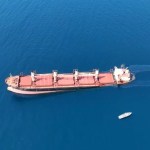Starliner’s first crewed flight would come nearly a year after the spacecraft flew to the space station and back without any humans in March, completing a critical demonstration mission for Nasa on its second try after software failures cut short a similar test flight in 2019.
Boeing and Nasa expect to fly the crewed mission after engineers correct issues encountered during Starliner’s March test flight, including a few onboard thruster failures during the spacecraft’s ascent to orbit that the company’s Starliner boss, Mark Nappi, attributed to debris.
“Currently, we’re targeting a launch date as early as February of 2023,” Steve Stich, head of the Nasa programme that oversees Starliner’s development, told reporters in a joint news conference with Boeing.
The crewed Starliner capsule is expected to integrate with its Atlas V rocket in November, Nappi said, once Nasa approves of Boeing’s fixes to the thruster issues. The Atlas V launch vehicle was built by a joint venture of Boeing and Lockheed Martin.
The eight-day mission, transporting Nasa astronauts Barry Wilmore and Sunita Williams to the station and back, would mark the final test mission before Nasa can certify Starliner for routine astronaut missions.
Once certified, the capsule would become Nasa’s second option for getting astronauts to and from the station, joining SpaceX’s Crew Dragon spacecraft, which was certified in 2020.
Boeing is under a $4.5-billion fixed-price Nasa contract for Starliner development and six routine missions after the spacecraft’s certification.
Launch schedule changes and engineering fixes resulting from Starliner’s March test mission cost Boeing $93-million, the company said in July, bringing Boeing’s total Starliner-related charges to $688-million since the spacecraft’s 2019 test failures.
(Reporting by Joey Roulette; Editing by Jonathan Oatis and Bill Berkrot.)





















Comments - Please login in order to comment.